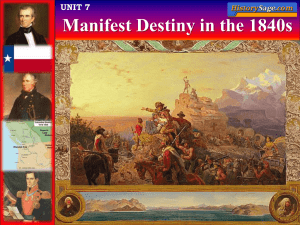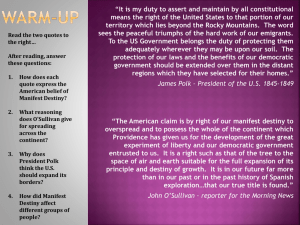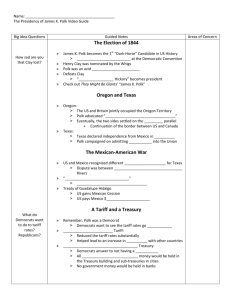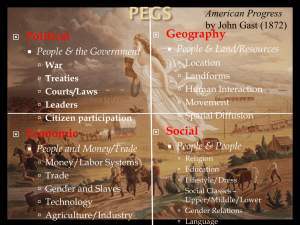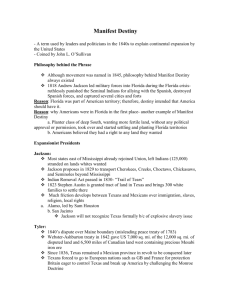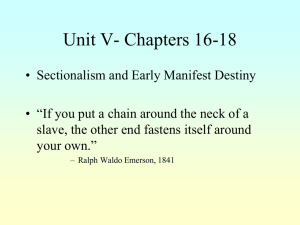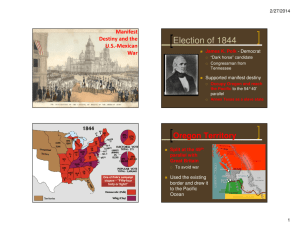Politics in the 1840s, James K. Polk, & Manifest Destiny
advertisement
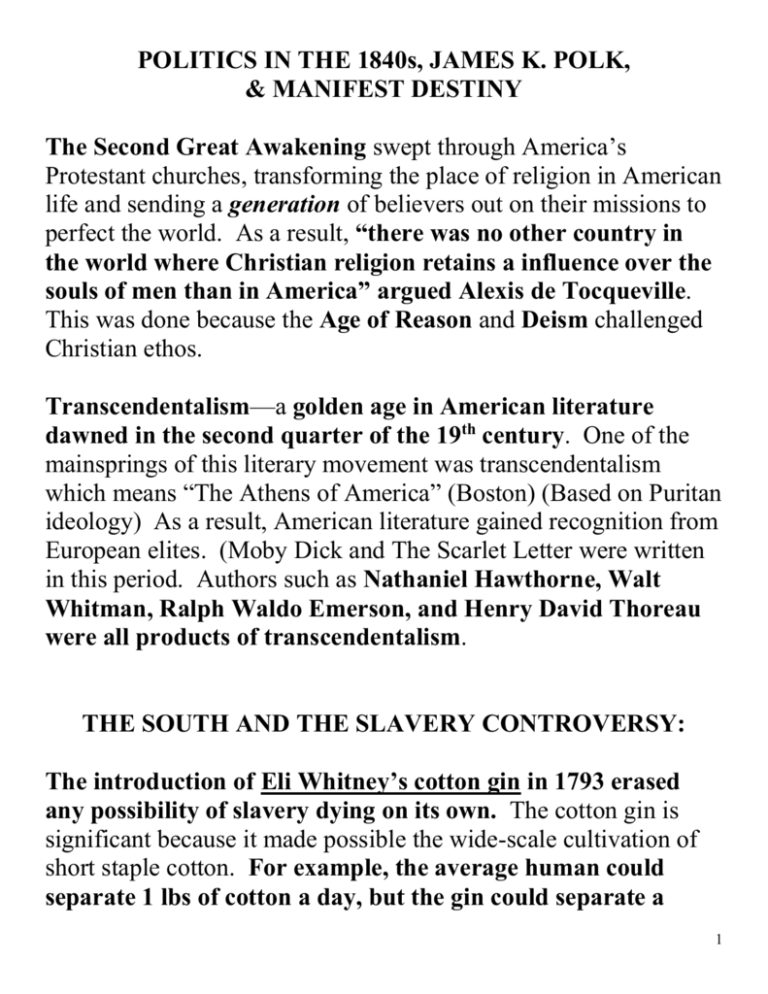
POLITICS IN THE 1840s, JAMES K. POLK, & MANIFEST DESTINY The Second Great Awakening swept through America’s Protestant churches, transforming the place of religion in American life and sending a generation of believers out on their missions to perfect the world. As a result, “there was no other country in the world where Christian religion retains a influence over the souls of men than in America” argued Alexis de Tocqueville. This was done because the Age of Reason and Deism challenged Christian ethos. Transcendentalism—a golden age in American literature dawned in the second quarter of the 19th century. One of the mainsprings of this literary movement was transcendentalism which means “The Athens of America” (Boston) (Based on Puritan ideology) As a result, American literature gained recognition from European elites. (Moby Dick and The Scarlet Letter were written in this period. Authors such as Nathaniel Hawthorne, Walt Whitman, Ralph Waldo Emerson, and Henry David Thoreau were all products of transcendentalism. THE SOUTH AND THE SLAVERY CONTROVERSY: The introduction of Eli Whitney’s cotton gin in 1793 erased any possibility of slavery dying on its own. The cotton gin is significant because it made possible the wide-scale cultivation of short staple cotton. For example, the average human could separate 1 lbs of cotton a day, but the gin could separate a 1 1,000 lbs. This created a huge demand for more slaves to plant cotton. Cotton is King—The Cotton Kingdom developed into a huge agricultural factory, pour out avalanches of cotton. It drastically increased the number of plantations in the South and factories in the North. Cotton accounted for half the value of all American exports after 1840. The Planter Aristocracy—Before the Civil War, the South was similar to an oligarchy, a government by the few. In 1850 only 1,700 families owned more than 100 slaves, and these families ruled the Southern political landscape and social apparatus. (John C. Calhoun and Jefferson Davis were prime examples of this.) Slaves and the Slave System—The economic structure of the South became monopolistic. This is significant because it was weary done the soil and severely limited the South’s revenue. Another cancer to the South was the financial instability of the plantation system. (what may or may not happen?) Slaves represented a high investment of about $1,200/per slave. This would plunge plantation owners in debt that may not be able to repay. The fiscal solvency of the system was very volatile. Southerners resented watching the North grow fat at their expense. (That’s just life!!) (The systems they chose—agriculture vs. industry.) The White Majority—Most whites DID NOT own slaves. Poor whites (a huge portion of society in the South) were scorned by 2 slaves as “poor white trash,” “hillbillies,” “crackers,” or “clay eaters.” All of these “Bubbas” were without slaves and had no direct stake in its preservation, yet they were among the stoutest defenders of the system. Why? It can be summed up in two phrases: STATES’ RIGHTS and social status!!!!! (PLEAS PAY SPECIAL ATTENTION TO THIS) Life Under the Lash—Southerners often romanticized about the happy life of their singing, dancing, banjo-strumming slaves. Everywhere slavery meant hard, back-breaking work, ignorance, and oppression. The worked from dawn till dusk and were watched by a white overseer or black “driver.” They had no civil or political rights from arbitrary cruel and murderous punishment. Floggings were common because with whip was the work incentive instead of raises. By 1860, most slaves were concentrated in the Black Belt of the Deep South. Early Abolitionism—The inhumanity of the “Peculiar Institution” gradually caused many antislavery societies to come forth. Many of these societies wanted to relocate slaves back to Africa, specifically countries like Liberia on the West Coast. The capital of Liberia is Monrovia, after Pres. James Monroe. 3 Radical Abolitionism—William Lloyd Garrison and his paper The Liberator were the two most prominent radical abolitionists. Garrison triggered a 30-year war of words and essentially fired one of the first barrages of the Civil War. Frederick Douglass—was the greatest black abolitionist. He escaped from slavery at 21 and in 1845 wrote the Narrative of the Life of Frederick Douglass. Douglass was very pragmatic and practical were Garrison was stubborn and principled. Douglass looked to politics to end the plight of slavery. These political abolitionists led the Free Soil Party of the 1840s, which eventually became the Republican Party with the Whigs. The South Lashes Back—Nat Turner, a preacher slave, led a rebellion based on religion (SGA). Whites put the rebellion down strongly and quickly. They argued that slaves were no different than whites that worked in harsh factories in the North. The South passed the Gag Resolution that required all antislavery legislation to be tabled without a debate. John Quincy Adams fought for eight years to get it repealed. MANIFEST DESTINY AND JAMES K. POLK More of 1840 Politics—“Tyler Too” and hard-ciderites dominated the political landscape in 1840. Harrison, Tippecanoe, just died. Tyler was the president. Tyler was not a Whig-hack that went head to head with Daniel Webster and Henry Clay. Tyler’s Administration—The Whig platform was a strong, nationalistic program with a financial reform coming first. The 4 Whigs wanted a “Fiscal Bank” to replace the BUS. It passed Congress, but Tyler vetoed it. The Democrats were jubilant saying Tyler saved us from another monster! ***Subnote: at this time Britain is picking a fight with us. They want the Oregon territory. The Lone Star of TX—Mexico refused to recognize TX independence. Mexican officials threatened war if America got involved with the status of TX. Britain was greatly interested by TX. A puppet TX could be used to turn against the Yankees. The US Gov’t strenuously objected to British actions based on the Monroe Doctrine. As a consequence, the Election of 1844 was centered on TX. Northerners vehemently opposed TX because of the expansion of slavery while Southerners cried “TX or disunion!” The Proexpansion Democrats were led by James K. Polk and the Whigs were led by Henry Clay. The continued existence of TX as an independent nation threatened to involve the U.S. in a series of costly wars in America and Europe. Plus, Britain argued that they had claim over the OR Territory. This was land on the West Coast that included land west of the Rockies all the way to the Alaskan panhandle on the 54-40 longitude/latitude line. The slogan became 54-40 or fight. Polk and A Mandate for Manifest Destiny—The Pro-TX South was able to elect Polk, Young Hickory, because he was a protégé 5 of Jackson. He made Manifest Destiny a central part of his administration. Manifest Destiny—a belief that America should extend its domain from coast to coast. Countless Americans believed that God had “manifestly” destined the American people to control the hemisphere. Polk was considered a “dark horse” candidate but his support of the Manifest Destiny ideals carried him to a decisive victory over Henry Clay and the Whig Party. Polk’s Purposes as President: Polk was a methodical, hardworking, shrewd, narrow-minded and persistent but not brilliant. Polk had four points he wanted to accomplish in four years and not rerun. 1) reduce the tariff; 2) have an independent treasury/not linked with the Fiscal Bank; 3 & 4) were to gain Oregon and TX. He was a strong believer in Manifest Destiny (54-40 or fight and TX) Polk was eager to by CA from Mexico but relations with Mexico City were embittered. The Mexican government recalled its minister from Washington. As a result, Polk dispatched John Slidell to Mexico City to work out a diplomatic solution in late 1845. Slidell was shunned. As a result, Polk prepared for a showdown. He ordered 4,000 men under Zachary Taylor to march to the Rio Grande just in case. 6 As a consequence, Polk planned on asking Congress for a Declaration of War based on two key factors: 1) unpaid claims; 2) Slidell’s rejection. These were flimsy causes for war and would feel better if Mexico shot first. That very evening Mexican troops crossed the Rio Grande and fired on Taylor and killed 16 soldiers. This commenced the MEXICAN WAR!!!!!!!!!! **Note-Abe Lincoln likened Polk’s war message to “the half insane mumbling of a fever-dream.” The Mastering of Mexico: Polk wanted Manifest Destiny but not war with Mexico or for that matter Britain. Polk was anxious to end the shooting as soon as he accomplished his territorial goals. The Treaty of Guadalupe Hidalgo was signed on Feb. 2, 1848. This ended the war and America now had TX, New Mexico, Arizona, California, and resolved the OR Territory (NV + UT) with Britain. The political caveat, of this was the Wilmot Proviso that prohibited slavery in the newly formed American territory. It caused another political uproar. It passed several times in the House but failed in the Southern dominated Senate. The W.P. is significant because it brought slavery to the forefront yet again. 7 MANIFEST DESTINY WAS ACHIEVED AND POLK DID NOT RUN FOR RE-ELECTION. HE DIED SHORTLY AFTER FROM CHOLERA. First time he saw the ground get busted He was 10, it was 1952 His daddy worked hard From sun up til sundown And the goin' got tough Behind them old gray mules The farm grew to be a money maker And the house he lived in Grew up room by room The boy worked hard But soon got tired of farmin' So he slipped away one night B'neath the harvest moon His neck was red As alabama clay But the city's call Pulled him away He's got a factory job And run's a big machine He don't miss the farm Or the fields of green Now the city's just a prison Without fences 8 His job is just A routine he can't stand And at night he derams of wide open spaces Gresh dirt tween his toes and on his hands Then one day a picture came Inside a letter Of a young girl With a baby in her arms And the words she wrote Would change his life forever So he went to raise his family On the farm His neck was red As alabama clay Now he's going home This time to stay Where the roots run deep On the family tree And the tractor rolls Through the fields of green His neck was red As alabama clay Now he's going home This time to stay Where the roots run deep On the family tree And the tractor rolls 9 Through the fields of green His neck is red As alababma clay 10
